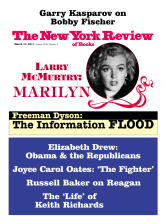In response to:
Outstripping the News from the November 25, 2010 issue
To the Editors:
Garry Wills’s appreciation of Garry Trudeau [NYR, November 25, 2010] echoes that extended by the trauma experts who are my colleagues. In August we gave him our first annual award for Media Contributions to the Field of Trauma Psychology* and we noted that
what matters most to [us] is Trudeau’s series of story lines about trauma. Three characters with combat-related PTSD are shown sympathetically and accurately, allowing his millions of readers to have a more nuanced and compassionate understanding of PTSD suffering.
But further, we noted:
Trudeau has created a blog on the Doonesbury website especially for military members to share their combat experiences; [we understand] that as using the media to prevent PTSD by creating a safe social networking web environment where active duty military members can share experiences.
In other words, we honored Trudeau not just for his comic strip and how well it informed its readers about PTSD—something that Garry Wills understood perfectly—but also for expanding the reach of his strip and its website to serve an additional real and serious purpose that may itself mitigate the damage of war trauma.
When we told Trudeau of this award, his e-mail response was characteristic:
What lovely news. Please thank…the award committee for this wonderful honor. My forebears, seemingly all of whom were doctors, will rest more easily knowing that I’m to be recognized for finally doing something useful.
We join Garry Wills in admiring Trudeau’s graphic and writerly gifts and his storytelling arcs. We add that we think, wry self-deprecation aside, that he has been useful indeed.
Harriette Kaley, Ph.D., ABPP
Chair, 2010 Awards Committee
Division of Trauma Psychology
(Division 56) of the American Psychological Association
This Issue
March 10, 2011
Marilyn
The Bobby Fischer Defense
How We Know
-
*
Also honored with the media award were Nicholas Kristof and Sheryl WuDunn for their equally effective work embodied in their book Half the Sky (Knopf, 2009). ↩



